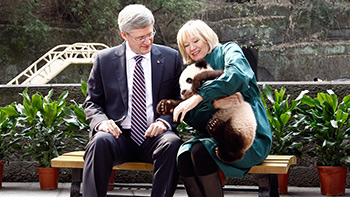Difference between revisions of "Panda Diplomacy"
(→Pandas as China's 'Goodwill Ambassadors' to the World) |
|||
| (2 intermediate revisions by 2 users not shown) | |||
| Line 2: | Line 2: | ||
=== Pandas as China's 'Goodwill Ambassadors' to the World === | === Pandas as China's 'Goodwill Ambassadors' to the World === | ||
| − | The Chinese practice of gifting pandas as a diplomatic gesture dates back to as far as the Tang Dynasty, when Empress Wu Zetian (625-705) sent a pair of pandas to the Japanese emperor. "Panda Diplomacy" was revived in the 1950s, at a time when the People's Republic of China actively sought to improve relations with governments in the West, with one of the first exchanges taking place in 1958. One of the most notable examples of this practice in recent history is the gifting of a panda to the United States in 1972, following the thawing of Sino-American relations and Nixon's visit to Beijing. In Chinese culture, pandas are regarded as a symbol of peace and friendship, with its black and white colour resembling that of "Yin-Yang", the ancient philosophy of harmony, often regarded as a cornerstone of modern Chinese foreign policy. In the last fifty years, these furry and increasingly rare 'Goodwill Ambassadors' have become prized possessions representing Chinese culture and its desire for peaceful cooperation. | + | The Chinese practice of gifting pandas as a diplomatic gesture dates back to as far as the Tang Dynasty, when Empress Wu Zetian (625-705) sent a pair of pandas to the Japanese emperor. "Panda [[Diplomacy]]" was revived in the 1950s, at a time when the People's Republic of China actively sought to improve relations with governments in the West, with one of the first exchanges taking place in 1958. One of the most notable examples of this practice in recent history is the gifting of a panda to the United States in 1972, following the thawing of Sino-American relations and [[Nixon, Richard|Nixon]]'s visit to Beijing. In Chinese [[Culture|culture]], pandas are regarded as a symbol of peace and friendship, with its black and white colour resembling that of "Yin-Yang", the ancient philosophy of harmony, often regarded as a cornerstone of modern Chinese foreign policy. In the last fifty years, these furry and increasingly rare 'Goodwill Ambassadors' have become prized possessions representing Chinese culture and its desire for peaceful cooperation. |
[[Category:Historical Acts of Cultural Diplomacy]] | [[Category:Historical Acts of Cultural Diplomacy]] | ||
Latest revision as of 13:17, 1 April 2014
Pandas as China's 'Goodwill Ambassadors' to the World[edit]
The Chinese practice of gifting pandas as a diplomatic gesture dates back to as far as the Tang Dynasty, when Empress Wu Zetian (625-705) sent a pair of pandas to the Japanese emperor. "Panda Diplomacy" was revived in the 1950s, at a time when the People's Republic of China actively sought to improve relations with governments in the West, with one of the first exchanges taking place in 1958. One of the most notable examples of this practice in recent history is the gifting of a panda to the United States in 1972, following the thawing of Sino-American relations and Nixon's visit to Beijing. In Chinese culture, pandas are regarded as a symbol of peace and friendship, with its black and white colour resembling that of "Yin-Yang", the ancient philosophy of harmony, often regarded as a cornerstone of modern Chinese foreign policy. In the last fifty years, these furry and increasingly rare 'Goodwill Ambassadors' have become prized possessions representing Chinese culture and its desire for peaceful cooperation.
